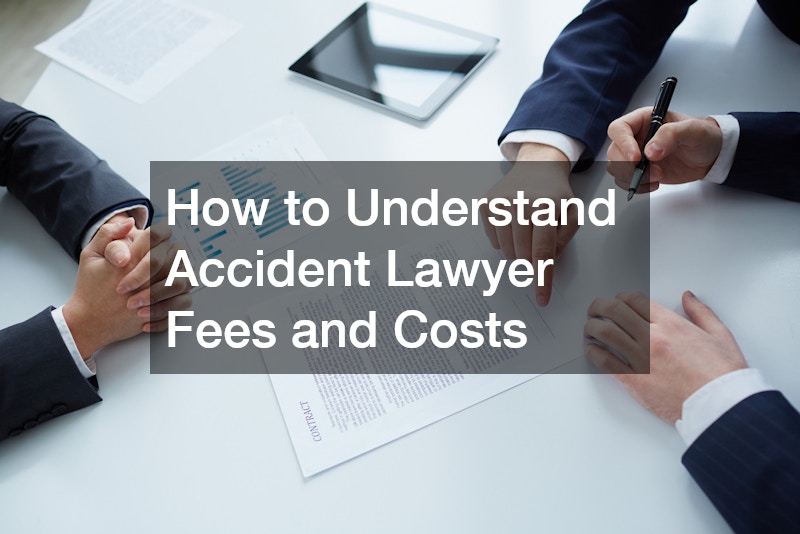
When involved in an accident, it is essential to seek professional legal assistance to navigate the complexities of personal injury claims. Among the first considerations for most individuals is the cost associated with hiring accident lawyers. Understanding the fees and costs involved can empower you to make informed decisions, ensuring you are financially prepared for the journey ahead.
Video Source
Accident lawyers typically employ various fee structures to cater to the diverse needs of their clients. The most common fee structure is the contingency fee arrangement, where the lawyer is compensated only if the client wins the case. This model is particularly advantageous for individuals who may not have the financial means to pay upfront legal fees. Another type of fee that some accident lawyers might use is the flat fee. This involves a fixed amount for specific services, providing a clear understanding of costs from the beginning.
Hourly rates are another prevalent fee structure used by accident lawyers. Under this arrangement, clients are billed based on the time spent working on their case. While this provides a clear correlation between effort and payment, it can sometimes lead to unpredictability in total costs. Clients must discuss and agree upon the hourly billing rate to avoid any misunderstandings. Many prefer flat fees or contingency arrangements for budgeting purposes.
Success fees are another potential component of accident lawyer costs. These are additional payments made if a lawyer secures a favorable outcome beyond the standard contingency fee. Such agreements reward lawyers for exceptional performance and client satisfaction. However, it is essential for clients to fully understand the terms of success fees and the scenarios in which they apply. Clear communication with your lawyer regarding any potential extra costs is vital for avoiding surprises.
Contingency fees are particularly common in personal injury cases managed by accident lawyers. This fee structure makes legal services accessible to a broad audience, as clients do not need to make any initial financial commitments. Typically, the lawyer receives a percentage of the settlement or judgment recovered. This percentage often ranges from 25% to 40%, depending on the complexity of the case and the jurisdiction. The beauty of this arrangement is that legal fees align with the success of the case.
Contingency fees pose minimal financial risk to the client, as they do not have to pay if the case is unsuccessful. However, it is imperative to confirm which incidental expenses might not be covered under this fee structure. These could include costs for filing fees, expert witness fees, or administrative expenses, regardless of the outcome. Transparency at the outset can prevent disputes over unforeseen costs that might arise during the proceedings. Always verify if such expenses will be deducted from the settlement amount.
Knowing that accident lawyers are willing to bear the burden of financial risk often incentivizes clients to pursue justice. It also encourages lawyers to diligently work on cases they genuinely believe in. Consequently, the client benefits from a mutually beneficial relationship focused on achieving fair compensation. This democratizes access to legal representation for all socio-economic backgrounds. Ultimately, the contingency model offers a symbiotic solution for both parties involved.
Beyond the primary legal fees, there are additional costs associated with hiring accident lawyers. These incidental expenses might cover investigative work needed to build a strong case, such as gathering evidence or hiring accident reconstruction experts. Administrative costs, like document preparation or communication fees, are also quite common. Court appearances and related travel expenses are often billed separately, making it imperative to ask about these during the initial consultations. Being proactive about inquiring into all potential costs can aid in financial planning.
Understanding and preparing for these additional fees requires open dialogue between you and your lawyer. A comprehensive fee agreement, clearly outlining what is included and what will incur extra charges, is essential. This document serves as a safeguard against unexpected financial burdens. Specifying who is responsible for covering these costs upfront can avoid disputes later on. It is advisable to review all elements of this agreement before formalizing any legal contract.
Controlling these expenses often falls on the client to make effective decisions, such as deciding on the necessity of certain investigative services. Openly discussing the strategy and potential costs with your accident lawyer can lead to more efficient case management. Opting for electronic communications and documentation over more traditional methods may also result in savings. Being judicious in every financial area improves not just your case outcome but also your overall experience with the legal process. Always remember, a well-managed case is a more manageable cost.
